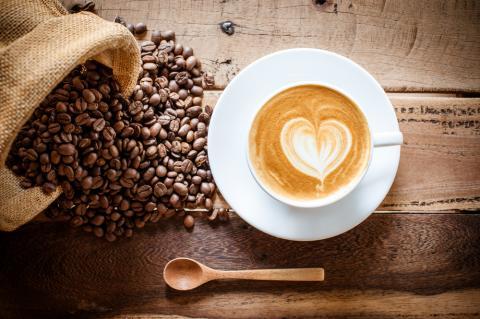
Getting lost in the jungle of research that surrounds the health benefits and harmful side effects of that strong, dark, pick-me-up in the morning, a steaming cup of Joe, is easy to do. Harvard’s School of Public Health reports favorably that coffee has the potential to reduce the risk of heart disease and stroke and lower the possibility of developing type 2 diabetes, as well as prevent gallstones. But the evidence is not concrete.
With an estimated 54% of adults drinking on average 3 cups of coffee a day or more in the United States, there is no wonder that coffee is a staple in many American households. But my question to you is, do you really need all that caffeine in your life? Yes, black coffee is a low calorie energy boost many can’t live without, but in addition to that giddy-up in your step, there are many drawbacks to reaching for yet another white chocolate mocha latte or venti, soy, caramel macchiato.
I have been that person pouring 1-2-3 cups of coffee just to muster the energy to power me through the day. I was living on the caffeine high pushing me through long hours managing a restaurant and giving yoga classes. At some point, I guess it was when I moved abroad, I became aware that what I thought was a casual rendezvous with “Joe” had become a daily habit or addiction.
One of the motivating factors propelling me to move abroad was to find more balance in my life and in doing so, I needed to evaluate if my relationship with coffee still served a positive role in my life. What I found was a deeper awareness of what my body really craved.
Yes, I love coffee and still do. Getting together with girlfriends over coffee is an event. Enjoying the robust flavor provokes certain memories and emotions. As a powerful stimulant it even served “somewhat” of a practical purpose. But what I found was that one cup was just enough. Any more affected my mood. It dictated when I fell asleep at night and how well I actually slept. When I started to wean myself from my dark liquid friend I realized my tummy discomfort also went away.
I found that by giving my body what it really desired -- a diet of fresh, whole unprocessed foods and adequate sleep, exercise and scheduled relaxation -- I actually didn’t NEED “Joe” anymore. On occasion, I will sit down for a cortado – an expresso with a splash of warm milk – with friends in some little café on some small side street in Barcelona, but it is rare. I have come to appreciate the wealth of other options that offer the same flavor and often more nutritional value.
It is not going to be easy to kick the habit, but try to exchange these favorites for 1-2 cups of coffee and eventually over time, you will find the cravings will subside and you will be able to function without this old sidekick.
Coffee Alternatives
Chicory Root Coffee
A deep roasted, slightly bitter, rich beverage is the closest it comes to drinking slow drip Arabica. With a reputation as a medicinal herb, used by Ancient Egyptians and the Romans, it was thought be an effective substance helping to purify the blood and detox the liver. Medieval monks in Europe were even known to grow these plants for the greater use on mainland Europe.
Dandelion Coffee
With a recent rise in popularity this coffee substitute has often been likened to matcha tea. A caffeine-free instant powder, it is actually a tea made from from roasted dandelion roots, but looks and tastes like coffee. With lower acidity and antioxidants than coffee, dandelion coffee contains probiotics which assist good bacteria in the gut, promoting a healthy digestion and boosting immunity.
Barley Coffee
Having been acknowledged for centuries for its health improving properties, barley was even “recommended” by Hippocrates in his On Regimen in Acute Diseases. Barley coffee is known to be high in beta glutens, which are known for their impact on lowering cholesterol levels. Barley, too, was used by the ancient Greeks to stimulate metabolism.
Roasted Corn Coffee
Made from a special variety of non-GMO, indigenous corn, its rich aroma, natural sweetness and nutty flavor liken that of coffee. With fire roasted corn as the base, this coffee alternative is free of caffeine, boosts immunity, detours hunger pangs, and helps to stabilize blood sugar levels. It also helps bloating, improves circulation, and alleviates migraines and headaches.
Try a Blend
Get creative and blend them all together. Nowadays there are a lot of coffee alternatives available at health food stores and specialty shops. Not sure what your favorite will be? Try a few, and don’t be afraid to mix it up a little. Be your own alternative barista and add beetroot extract, dried figs, toasted almonds and dates.
Breaking your coffee addiction won’t be easy, but with these amazing alternatives and a little ingenuity, I am sure you will find that warm beverage that will create more balance in your body and in your life.
Research Base
https://www.hsph.harvard.edu/news/multimedia-article/benefits/








